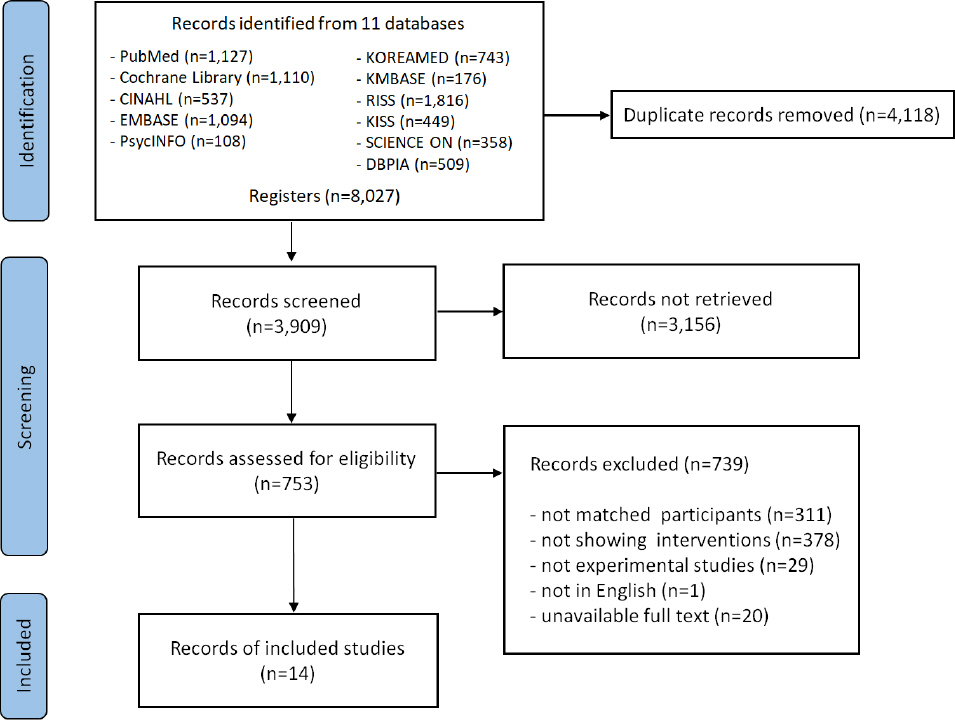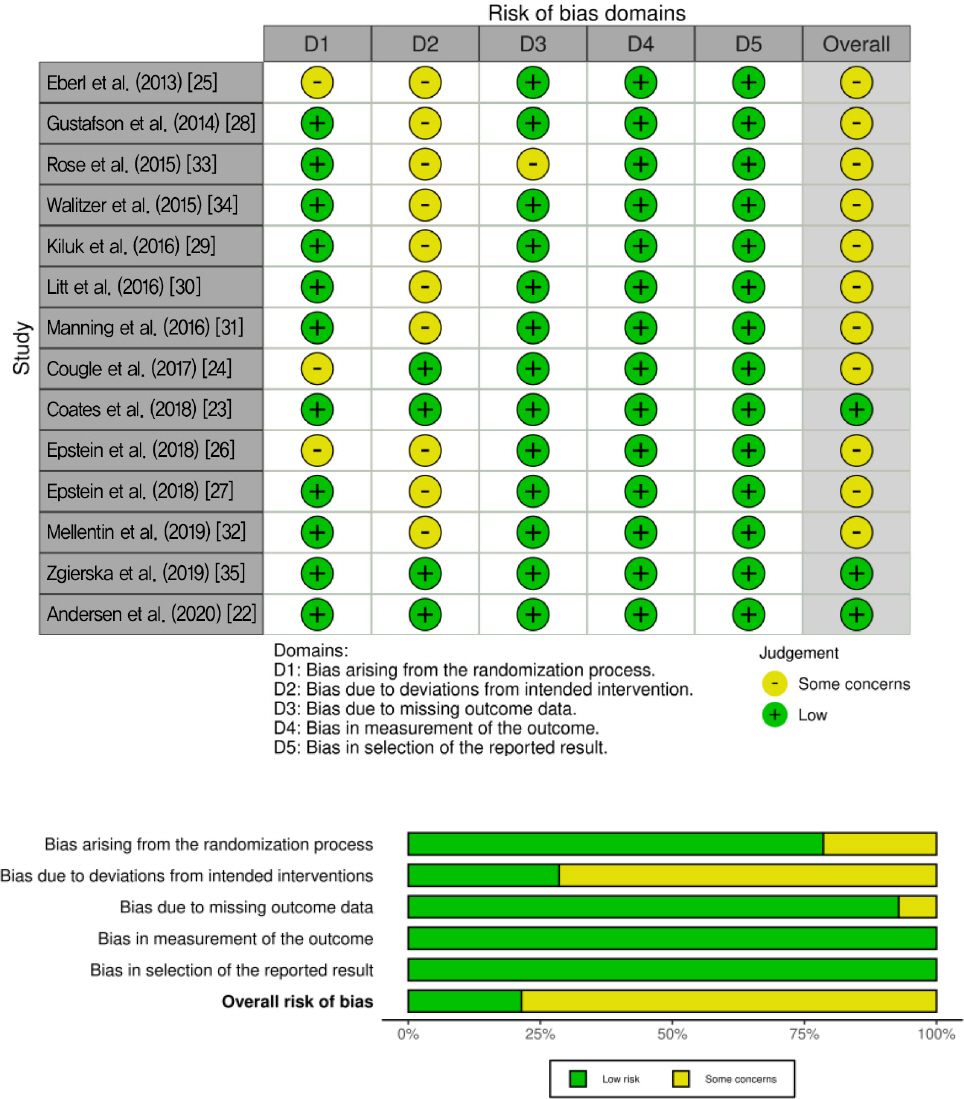서 론
연구의 필요성
연구 방법
핵심 질문
연구 대상(Paticipants): 본 연구에서는 알코올 사용 장애 환자를 연구 대상으로 하였다.
중재(Intervention): 본 연구에서는 알코올 사용 장애 환자에게 제공된 심리 사회적 중재 프로그램을 대상으로 하였다. 프로그램의 유형에는 치료, 교육, 요법, 상담, 훈련 등 다양한 중재를 포함하였다.
대조군(Control): 본 연구에서는 비교군이 있는 연구를 모두 포함하였다.
결과(Outcomes): 본 연구에서는 알코올 사용 장애 환자에게 프로그램이 제공된 후 측정된 정량적 값을 포함하였으며, 결과변수는 효과의 유의미성에 관계없이 모두 포함하였다.
연구 설계(Study Design): 본 연구에서는 무작위 대조군(randomized control trial) 연구 설계만을 포함하였다.
문헌검색 전략
● 문헌검색
● 검색어
● 문헌 선정과정
● 문헌의 질 평가
● 자료분석
연구 결과
문헌 추출 결과
최종분석에 선정된 문헌의 일반적 특성
Table 1
| References | Country | Participants | ||||
|---|---|---|---|---|---|---|
|
|
|
|||||
| Author | Year | No.* | Sample size | Mean±SD (range) of age | Sex (n or %) | |
| Eberl et al. | 2013 | 25 | Germany | Total: 475 | Total: 46 (19-79) | N/A |
| Gustafson et al. | 2014 | 28 | USA | E: 170, C: 179 | E: 38.3±9.5, C: 38.4±11.2 | F: 137, M: 212 |
| Rose et al. | 2015 | 33 | USA | E: 81, C: 77 | E: 49.17±10.70, C: 48.12±9 | F: 47%, M: 53% |
| Walitzer et al. | 2015 | 34 | USA | E1: 40, E2: 36 | E1: 46.7±8.6, E2: 45.9±9.0 | F: 44.7%, M: 55.3% |
| Kiluk et al. | 2016 | 29 | USA | E1: 22, E2: 24, C: 22 | E1: 41.9±11.2, E2: 43.9±13.1, C: 42.3±11.6 | F:24, M: 44 |
| Litt et al. | 2016 | 30 | USA | E1: 97, E2: 96 | E1: 45.1±9.8, E2: 47.2±11.2 | F: 34.2%, M: 65.8% |
| Manning et al. | 2016 | 31 | Australia | E: 41, C: 42 | E: 40.2±10.0, C: 39.8±8.9 | F: 41, M: 42 |
| Cougle et al. | 2017 | 24 | USA | E: 30, C: 28 | E: 39.33±11.98, C: 42.18±12.81 | F: 40, M: 18 |
| Coates et al. | 2018 | 23 | Australia | E: 186, C: 193 | E: 43.34±11.09, C: 45.26±10.36 | F: 133, M: 246 |
| Epstein et al. | 2018 | 26 | USA | E1: 44, E2: 55 | E1: 47.43±9.41, E2: 48.24±8.45 | F: 99 |
| Epstein et al. | 2018 | 27 | USA | E1: 65, E2: 73 | E1: 47.75±12.98, E2: 49.44±10.58 | F: 138 |
| Mellentin et al. | 2019 | 32 | Denmark | E1: 54, E2: 54, C: 56 | E1: 48±13, E2: 46±14, C: 45±12 | F: 37, M: 127 |
| Zgierska et al. | 2019 | 35 | USA | E: 57, C: 55 | E: 40.5±12.1, C: 41.9±11.9 | F: 49, M: 63 |
| Andersen et al. | 2020 | 22 | Denmark | E1: 351, E2: 342 | Total: 64 (62-68) | F: 279, M: 414 |
선정 문헌의 질 평가 결과
심리 사회적 중재 프로그램의 특성 및 유효성
● 중재 프로그램의 특성
Table 2
| References | Intervention | Outcome | ||||||||
|---|---|---|---|---|---|---|---|---|---|---|
|
|
||||||||||
| Author | Year | No.† | Name/device | Length (min) | Sessions (n) | Format | Setting | Assessment time | Primary outcome (p-value) | Secondary outcome (p-value) |
| Eberl et al. | 2013 | 25 | Cognitive bias modification/computer | 15 | 12 | I | H | Pre-treatment Post-treatment 12-month f/u | Alcohol-avoidance behavior (<.001) | Strength of inhibitory* Relapse rate (.039) Depression* Self-esteem* Symptom* Alcohol abstinence self-efficacy* Scores of alcohol use disorders identification test* |
| Gustafson et al. | 2014 | 28 | Alcohol-comprehensive health enhancement support system/smartphone | N/A | N/A | I | C | Pre-treatment 4-month f/u Post-treatment 12-month f/u | Risky drinking day (.003) | Abstinence rate (.03) Negative consequences of drinking* |
| Rose et al. | 2015 | 33 | Alcohol therapeutic interactive voice response/telephone | N/A | N/A | I | C | Pre-treatment Post-treatment 2-week f/u 2, 4, 12-month f/u | Drinking days per week (.04) Drinks per week (.27) Drinks per drinking day (.45) Percent reported drinking last 30 days (.28) Percent reported drinking heavily last 30 days (.42) | Participant perceptions* |
| Walitzer et al. | 2015 | 34 | E1: Alcoholics anonymous facilitation treatment E2: Alcohol-adapted anger management treatment | 60 | 12 | G+I | C | Pre-treatment Post-treatment 3, 6-month f/u | Percent of days abstinent* Drinks per drinking days* Shot inventory of problem* | Anger* Anger-related cognitions* AA involvement* Client satisfaction* |
| Kiluk et al. | 2016 | 29 | E1: Computer-based version of CBT program E2: Computer-based version of CBT+brief clinical monitoring | 45 | 8 | I | C | Pre-treatment Weekly Post-treatment 1, 3, 6-month f/u | Alcohol consumption: Percentage of days abstinent (.01) Percentage of heavy drinking days (.62) | The therapeutic alliance* Satisfaction* |
| Litt et al. | 2016 | 30 | E1: Packaged cognitive-behavioral treatment E2: Network support | 60 | N/A | G | C | Pre-treatment Post-treatment 6, 9, 12, 18, 21, 24, 27-month f/u | Drinking and drug use outcome* | Drinking inventory of consequence* Network support* Alcohol abstinence self-efficacy* Coping strategy* Readiness to change* Emotional distress* Anxiety* |
| Manning et al. | 2016 | 31 | Cognitive bias modification training/computer | 15 | 4 | I | H | Pre-treatment Post-treatment 2 weeks f/u | Alcohol consumption: Abstinence rate (.02) | Craving (.56) |
| Cougle et al. | 2017 | 24 | Interpretation bias modification-hostility/computer | N/A | 8 | I | C | Pre-treatment Post-treatment 1-month f/u | State-trait anger expression* | Drinking motives coping anger* Drinker inventory of consequence* Word sentence association paradigm (<.001) Number of drinks in a typical week during past month* Depression* Credibility/expectancy (.056) |
| Coates et al. | 2018 | 23 | Personalized cognitive-behavior therapy | 60 | 8 | I | H | Pre-treatment Post-treatment | Alcohol use disorders identification test* Severity of alcohol dependence* | Alcohol craving experience* Drinking expectancy* Impulsivity* Drinking behavior* |
| Epstein et al. | 2018 | 26 | E1: Female-specific CBT E2: Gender neutral CBT | 60~90 | 12 | I | C | Pre-treatment Post-treatment 9, 15-month f/u | Alcohol consumption: Percent drinking days (.85) Percent days heavy drinking (.36) | Readiness to change: Taking steps (.680) Recognition (.530) Ambivalence (.847) Depression (.201) Anxiety (.860) Situational confidence (.323) Coping behaviour (.200) Sociotropy-autonomy: Sociotropy (.545) Autonomy (.690) Important people interview: %Network encouraging abstinence (.191) %Network abstaining/recovering (.011) Dyadic adjustment* Daily drinking* Working alliance* Client satisfaction* |
| Epstein et al. | 2018 | 27 | E1: Female-specific CBT E2: Individual female-specific CBT | E1: 90~120 E2: 60~90 | E1: 12 E2: 12 | E1: G E2: I | C | Pre-treatment Post-treatment 3, 9, 15-month f/u | Percentage of drinking days (.09) Percentage of heavy drinking days (.15) Any drinking (binary) (.10) Any heavy drinking (binary) (.22) | Anxiety (.39) Depression (.35) Social support: Network abstainers/in recovery (.95) Network encouragement for abstinence (.70) Self-efficacy (.29) Self-care (.08) Coping (.22) Sociotropy-autonomy: Sociotropy (.94) Autonomy (.21) Interpersonal problem (.53) |
| Mellentin et al. | 2019 | 32 | E1: Cue exposure therapy aftercare E2: Cue exposure therapy aftercare/mobile phone | E1: 120 E2: 15 | E1: 4 E2: 32 | E1: G E2: I | C | Pre-treatment Post-treatment 6-month f/u | Alcohol consumption: Sensible drinking (E1:.76, E2:.53) Abstinence (E1:.33, E2:.65) Drinking days (E1:.61, E2:.83) Days with excessive drinking (E1:39, E2:.28) | Craving: VAS mean (E1:.34, E2:.71) VAS peak (E1:.18, E2:.80) Urge-specific copig skills: Urge-specific coping skills use (E1:.02, E2:.03) Urge-specific coping skills effectiveness (E1:.09, E2:.08) Cue induced craving* |
| Zgierska et al. | 2019 | 35 | Mindfulness-based relapse prevention | 120 | 8 | G | C | Pre-treatment Post treatment 26-week f/u | Alcohol consumption: Reporting any drinking (.939) Reporting any heavy drinking (.779) Drinks per day (.199) %Drinking days (.106) %Heavy drinking days (.486) | Drinking-related consequences (.139) Perceived stress (.245) Mindfulness attention and awareness (.061) |
| Andersen et al. | 2020 | 22 | E1: Motivational enhancement therapy E2: Motivational enhancement therapy+community reinforcement approach | E1: 60~90 E2: 60~90 | E1: 4 E2: 12 | G | C | Pre-treatment Post treatment 12, 26, 48-week f/u | Alcohol consumption: Number of drinking days* Average drinks per week* | Severity of dependence* Quality of life* |











